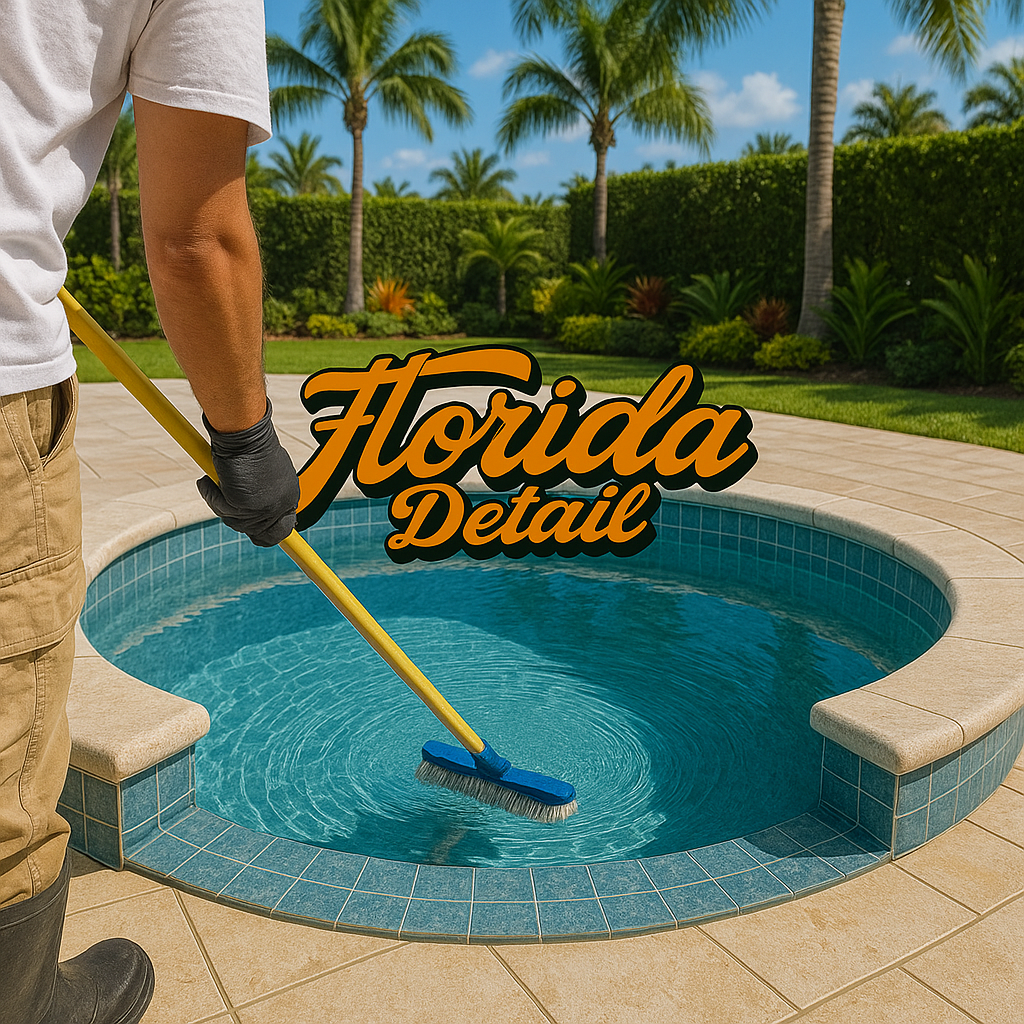🧽 How to Remove Stains From Pool Tiles Without Harsh Chemicals
Introduction
Your pool tiles do more than just add beauty—they protect your pool’s structure and make swimming more enjoyable. But in Florida communities like Port Charlotte, Punta Gorda, North Port, Rotonda, and Charlotte County, stains can quickly appear on tiles from calcium, algae, or metal buildup.
While many homeowners reach for strong acids and harsh chemicals, those solutions can damage grout, shorten tile life, and harm your pool water balance. The good news? You can keep your pool tiles sparkling without harsh chemicals by using safe, natural methods and regular maintenance.
At Florida Detail, we specialize in keeping pools clean, safe, and long-lasting. Here are the best ways to remove stains from pool tiles naturally.
✅ 1. Use a Pumice Stone for Calcium Deposits
- A pumice stone is a natural abrasive that scrubs away stubborn white calcium stains.
- Always keep the stone wet while scrubbing to avoid scratching tiles.
- Works especially well on ceramic and porcelain tiles.
👉 Pro Tip: Test on a small area first to ensure no surface damage.
✅ 2. Baking Soda Paste for Gentle Scrubbing
- Mix baking soda with water to create a thick paste.
- Apply to stained areas and scrub with a soft brush.
- Safe, eco-friendly, and effective for minor algae and oil stains.
✅ 3. Vinegar Spray for Mineral Build-Up
- White vinegar breaks down light scaling and mineral deposits.
- Spray directly on stains and scrub with a non-abrasive sponge.
- Rinse thoroughly to maintain balanced pool chemistry.

✅ 4. Salt and Lemon Juice for Spot Cleaning
- Lemon juice naturally dissolves mild stains.
- Combine with salt for a gentle abrasive effect.
- Perfect for small areas around the waterline.
✅ 5. Regular Brushing to Prevent Stains
- Prevention is always easier than removal.
- Brush tiles weekly, especially around the waterline, steps, and shady spots.
- This stops algae and debris from bonding to the surface.
✅ 6. Maintain Balanced Pool Chemistry
- High pH and calcium hardness cause scaling.
- Metals in water (like copper or iron) create brown or green stains.
- Weekly service ensures water stays balanced, reducing stain risks.
🌴 Real Example in Punta Gorda
One Punta Gorda homeowner struggled with stubborn white scaling. Instead of an acid wash, our team used pumice stones and baking soda paste combined with balancing their calcium hardness levels. The result? Their tiles looked new—without harsh chemicals or expensive resurfacing.
❓ FAQs About Pool Tile Stains
Q1: Can vinegar harm my pool water?
Not if used sparingly on tiles. Always rinse tiles thoroughly after cleaning.
Q2: Will a pumice stone scratch my tiles?
If used gently on ceramic or porcelain tiles, it’s safe. Avoid on vinyl or fiberglass.
Q3: What causes brown stains on tiles?
Usually metals (iron or copper) from pipes, heaters, or well water.
Q4: Is weekly service necessary if I clean tiles myself?
Yes. Professional service keeps chemistry balanced, which is the root cause of most stains.
Conclusion
You don’t need harsh chemicals to keep your pool tiles beautiful and stain-free. With natural solutions like pumice stones, baking soda, vinegar, and regular brushing, your pool will stay inviting and safe. Even better—consistent weekly service ensures stains don’t return.
If you live in Charlotte County, Port Charlotte, North Port, Punta Gorda, or Rotonda, trust the experts at Florida Detail for stress-free maintenance.
👉 Explore more eco-friendly pool care tips at UnlimitedManiac.com and check resources like NorthPortPoolServices.com.
